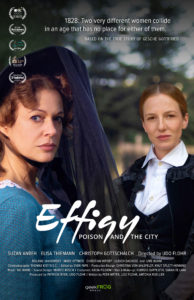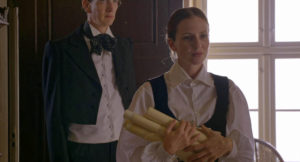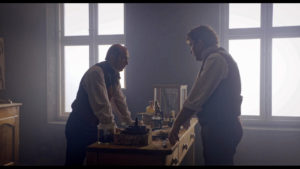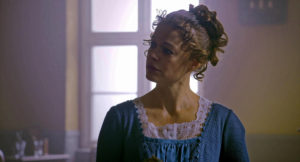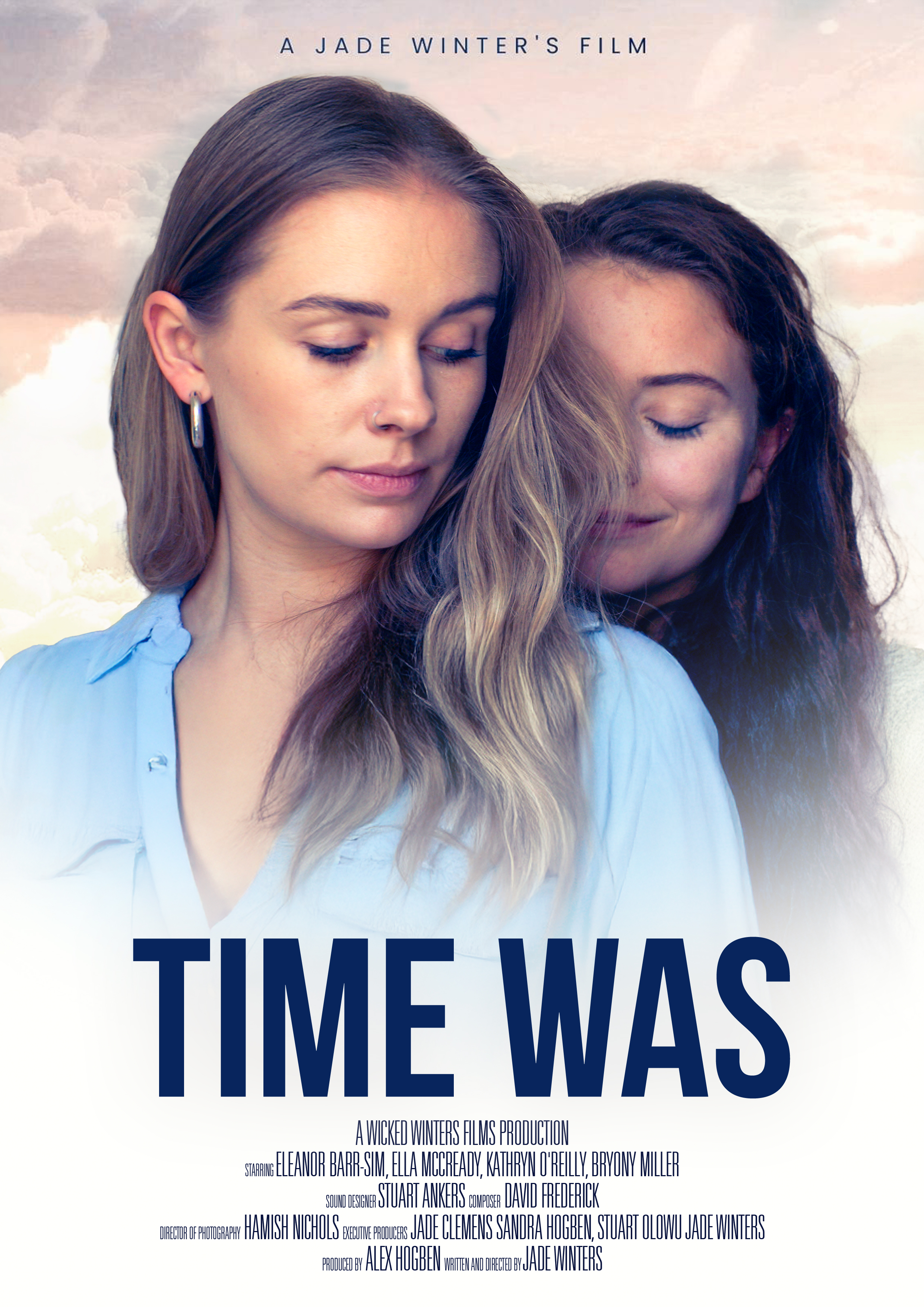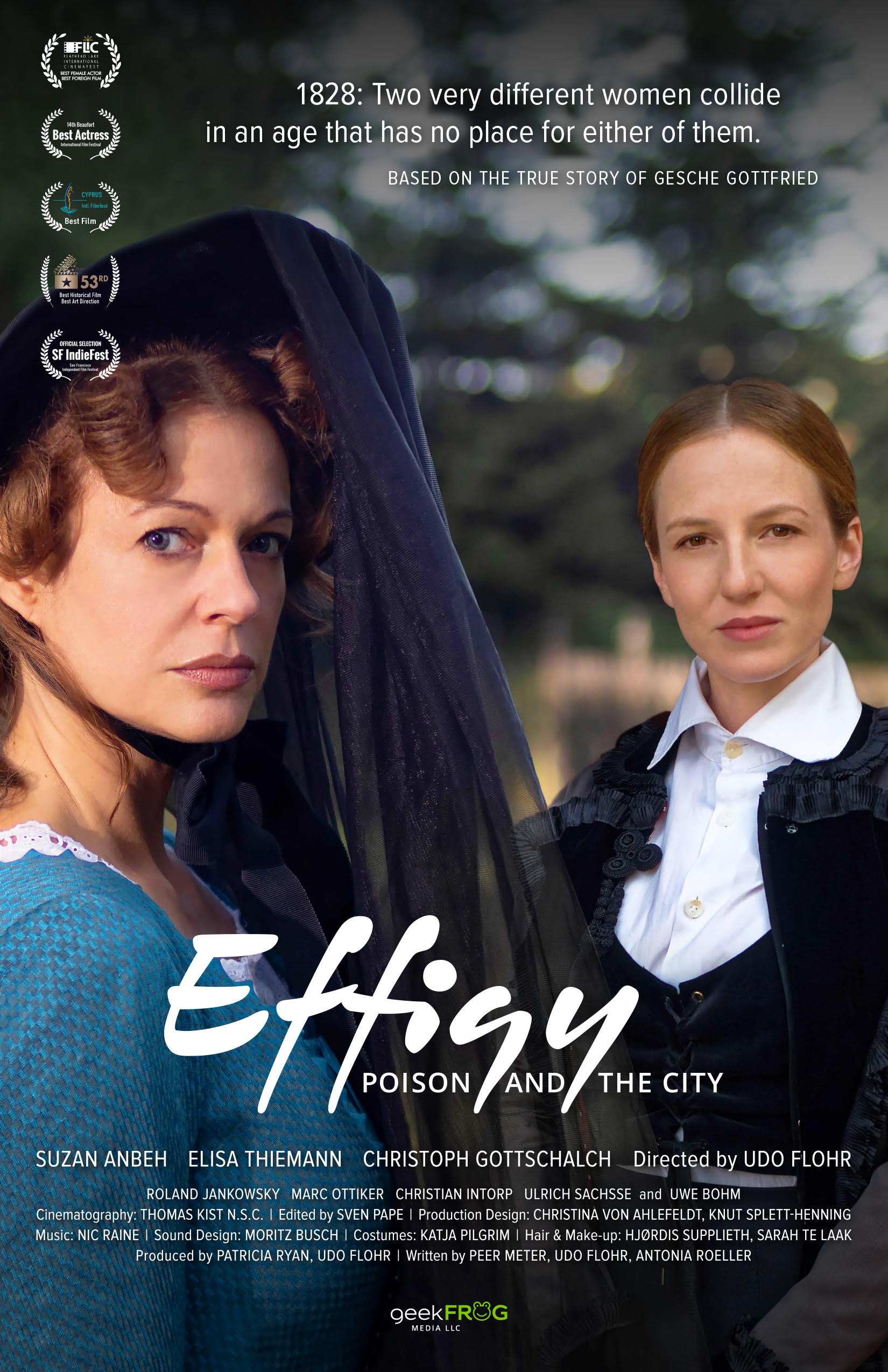
Indie Film Review “Effigy: Poison and the City”
WATCH THE TRAILER HERE
First, the Recap:
The fabric of an aberrant mind. We see the world around us, often trying to ascertain exactly why there are those whose jaded viewpoint and state of being can initiate the unthinkable. Believing there is “good” to be accomplished through actions which are overtly malicious and tainted with preconceived, outright evil intent, the individual still operates with impunity until, at some inevitable point, the scales tip against them. Then, what other means will they stoop to in order to preserve their habits? It is 1828, Bremen, Germany, and newly appointed law clerk Cato Bohmer (Elisa Thiemann) arrives to take on her new role in a man’s world not ready or accepting of her status or qualification. Striving to make herself indispensable to the current Senator, Droste (Christoph Gottschalch), they both get caught up in the world of Gesche Gottfried (Suzan Anbeh), a highly devious murderess whose time may have finally come.
Next, my Mind:
Based on actual events involving the very infamous “Angel of Bremen”, accused of killing upwards of 15 people via arsenic poisoning, all while exhibiting a public persona whose care for sick family members and neighbors gained her the moniker, this excellently crafted, intelligently affecting, smoothly paced, wonderfully executed historical drama from writer/director/producer Udo Flohr, writers Peer Meter and Antonia Roeller, plus producer Patricia Ryan flows with beautiful purpose and targeted potency. Offering an atmosphere of the age the narrative resides in that delivers both thriller-esque sequences paired with beautifully understated yet no less impactful, haunting, and engaging dramatic drive, the story of a female serial killer and the law clerk who becomes both nemesis and obscure confidant to her deftly explores an era where both women are actually very much out of place.
Added to the already slowly building tension is simply the illustration of other societal facets that were occurring during this period in Bremen, a city on the edge of newly discovered modernity as both a port and a potentially financially lucrative train hub. Meanwhile, greed and political maneuvering accompany the existing, abject discrimination and still-developing contemporizing of the criminal court and the means to resolve malfeasance that’s been right under their noses, based on a male-dominated paradigm and lack of ability to prove guilt that has been cleverly veiled, yet obvious to those truly paying attention. It makes the dynamics involved with events depicted that much more fascinating and credible to watch unfold, as one woman struggles to defy all expectations and excel while another begins a desperate attempt to get away with her murderous proclivities, gradually coming to a
How this dichotomy of reasoning plays out is alone worth investing in here, and it really does make up the core foundation of the narrative, with other characters ultimately being satellites orbiting the two primary suns at the center of a tumultuous universe. What period pieces like this are often exceptional at when done well is portraying the realms they encompass with accuracy of costuming, language, and setting in order to transport us as the viewer into that time. Here, this is indeed implemented thanks to crisp camera work that engulfs you in the pristine beauty of Bremen’s countryside and town a la the early 1800’s, perfectly designed clothing to accent the culture, and equally varying shots that emphasize the characters to apropos degrees, suiting each sequence so as to most effectively present the given gravity of the circumstances shown. The music score likewise provides a sonic tapestry that doesn’t overwhelm, but evokes each mood with precision.
Anbeh is a treasure through her role as Gesche, an entirely unassuming woman whose confidence and community-centric actions fully belie that actuality that has burned within her for mostly undisclosed reasons, a point that has then baffled any law officers making attempts to accuse and arrest her. Yet, as time has progressed, others within Gesche’s circle of malevolent influence have begun to be fed up of suspicions they’ve carried and soon she finds herself in the crosshairs of the young, determined, and idealistic Cato along with Senator Droste, who has not always been on the right side of Gesche’s cunningly manipulative “I’m a victim” ploys and seductive machinations. Watching as Gesche’s reign of terror starts to unravel is an exercise in intense, slow burn, calculatingly composed menace then vulnerability that Anbeh pulls of with a delicious level of frequent, muted vigor, very much selling us on the character’s ominous doings, and making the finale even more gripping yet oddly heartbreaking.
Thiemann likewise provides us with a magnificent performance (her DEBUT lead role, mind you) as Cato, a fresh-off-the-boat (as it were) law clerk thrust into a man’s world but holding an absolute resolve to show that she is more than capable of utterly shattering and withstanding the sexist intolerance and doubtful mindsets prevalent upon her arrival to the criminal court. Never backing down, Cato fully dives into the intricacies involved with the investigation into Gesche, even as she finds herself both strangely drawn to the killer while also being understandably shocked and repulsed by the sheer dispassion and eerily calm intentionality Gesche exudes through it all. Again, the power here is, like Anbeh, Thiemann’s ability to convincingly draw us into Cato’s plights throughout the film with both muted and blatant levels of boldness that so deftly fit the character’s experiences and grant us a woman we cannot help but be rooting for to completely succeed in any task she’s set her mind to while still allowing for her own vulnerabilities to be showcased as well. It’s a strong showing for a strong character, and Thiemann triumphs with grace and intent.
Primary supporting roles are many and just as fruitfully offered through Gottschalch as Droste, the criminal court’s current overseer who finds himself embroiled in conflicts of conscious and moral choice from multiple sides while trying to be upstanding, Roland Jankowsky as local port officer Capt. Ehlers, a man pushing to maintain his status and his trade as the primary beneficiary for Bremen’s prosperity while possibly taking a shine to Cato, Uwe Bohm as local investigator Tonjes, who’s trying to be the one to solve the case but perhaps resents Cato’s involvement, Marc Ottiker as Dr. Hoffschalger, Bremen’s forensic doctor who proves the poison being utilized in Gesche’s murders, Tom Keidel as Muller, Droste’s court attendant, Peer Roggendorf as Gesche’s current husband Rademacher Rumpff who may not realize that his life could end sooner than he might wish, Christian Intorp as local miller Steitz, a man riddled with truths and suspicions about Gesche, and Ulrich Sachsse as Bremen’s not quite on the up and up Mayor Smidt.
Additional but no less important turns arrive from Nicola Melissian, Eugen-Daniel Krößner, Marita Marschall, Susanne Jansen, Lea Wolfram, Manfred Schlosser, Tim Ehlert, and Ruben Apel among others. So, in total, “Effigy: Poison and the City” is indie cinema as it should be–a character and narrative-driven exploration into the both the lighter and darker sides of human nature–while providing evocative performances and stand-out direction, visual execution, and raw heart that reflect the true ambition of filmmakers wanting to show just what the independent community is all about. This critic could honestly see why the film made it into 30+ festivals and won 20 awards. It’s really that worth seeing. So, do it!
As always, this is all for your consideration and comment. Until next time, thank you for reading!
